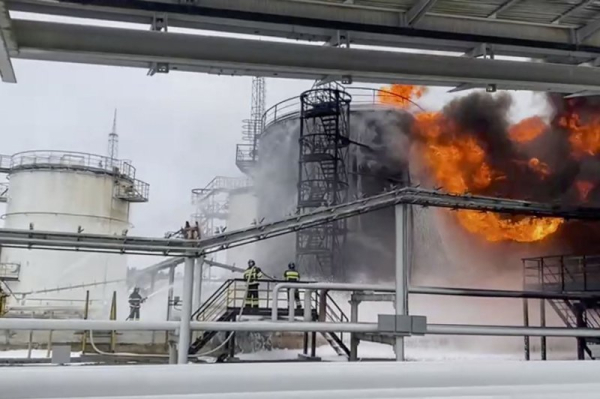

One of Russia’s largest oil refineries at Salavat in the Urals was set ablaze by Ukrainian drones that had flown almost 1,000 miles east from Ukraine. File photo courtesy Russian Emergencies Ministry/EPA-EFE
Ukrainian drones flew almost 1,000 miles into Russian territory to hit one of the country’s largest oil refineries on Wednesday, the second time the facility has been attacked in the past week.
The Security Service of Ukraine, or SBU, operation set the Neftekhim Salavat plant in the Russian republic of Bashkortostan ablaze after it was struck by multiple drones, according to SBU sources cited by the state-run news agency Ukrinform.
Footage circulating online showed large columns of thick, black smoke billowing from the site, with the BBC saying it had used satellite mapping and reverse image searches to verify that the images in the two separate videos were genuine.
Radiy Khabirov, Bashkortostan regional governor, confirmed on social media that Ukrainian drones had struck the Gazprom Neftekhim refinery.
“All emergency services are working on site, and efforts to extinguish the fire are underway,” said Khabirov.
The SBU source said the plant, which is operated by the majority state-owned gas giant Gazprom, was one of Russia’s largest petrochemical facilities, producing about 150 varieties of petrol, diesel, fuel oil, bitumen and polyethylene.
Wednesday’s attack came six days after two Ukrainian drones struck the same facility, causing a huge blast.
Ukrainian forces have stepped up their attacks on Russia’s energy infrastructure as a tactic to disrupt its war machine. It views the sector as a legitimate military target, both for its role in providing the energy products to fuel Russian forces’ tanks, aircraft and drones and the revenue it generates to pay for the war.
Kyiv has achieved a greater degree of success deploying long-range missiles against refineries, oil depots and other military-industrial targets this year, knocking production offline and causing shortages.
Russian President Vladimir Putin admitted gas was in short supply for the first time earlier this month, warning that demand in the country’s Far East was outstripping supply and that he expected that a significant increase in demand going forward would only worsen the situation.